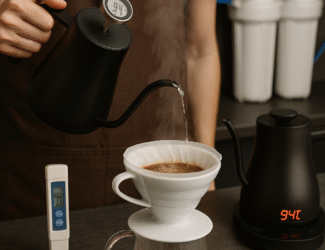
Cautions Raised on Exploiting Coffee’s Health Benefits for Commercial Gain
In a recent study, alarming warnings have been sounded regarding the potential hazards linked to the commercialization of coffee’s health benefits. The study, featured in Coffee Intelligence, underscores the imperative to critically assess health claims associated with coffee products.
Over the past decade, extensive research has consistently linked moderate coffee consumption to a lower risk of type 2 diabetes, heart disease, certain cancers, and cognitive diseases like Alzheimer’s and Parkinson’s. A noteworthy revelation indicates that consuming one cup of coffee every six hours may even reduce the risk of contracting the coronavirus.
Coffee, recognized for its abundant bioactive compounds, antioxidants, and polyphenols, is increasingly hailed as a superfood renowned for fortifying and protecting the body. Cold brew has gained widespread popularity as a pre-workout drink, while black coffee has become a staple in the fitness community.
However, it is crucial to discern between the health benefits attributed to pure black coffee and the potential drawbacks introduced by additives. The surge in coffee’s popularity as a superfood has led to an influx of products containing artificial sweeteners, flavors, preservatives, emulsifiers, stabilizers, and artificial colors.
The study underscores previous findings revealing that 98% of 131 flavored hot drinks from major coffee chains exceeded three times the recommended daily sugar intake for adults, sparking concerns about the long-term health impact. With the global ready-to-drink coffee market poised to surpass $42 billion by 2027, there is a notable shift towards customizable beverages, significantly contributing to the industry’s growth.
This trend aligns with the broader discourse surrounding the infiltration of ultra-processed foods (UPFs) into global diets. In the UK, for example, 65% of the average diet consists of ultra-processed foods, a factor linked to obesity, cardiovascular disease, and various health-related issues.
The study affirms that leveraging the health benefits of coffee has become an effective marketing strategy for new products, especially given the heightened focus on health and wellness, particularly among Generation Z and younger millennials. Whether intentional or not, some new products are capitalizing on coffee’s well-established health reputation, potentially risking the tarnishing of coffee’s image as these products emerge as a new face of the industry.
Compounding concerns, health and wellness claims in the coffee sector remain entirely unregulated, providing brands ample latitude to make unverified assertions about their products without the need for research or studies to substantiate them. While acknowledging the need for comprehensive, well-funded research, it raises concerns about potential biases when research is funded by entities that stand to profit from promoting the health benefits of coffee.
This underscores the critical importance of exercising heightened scrutiny when confronted with health and wellness claims for new coffee products, especially until such claims are subject to more stringent regulation. Ultimately, the reputation of coffee itself is at stake, necessitating a cautious approach to protecting consumer confidence and well-being.



